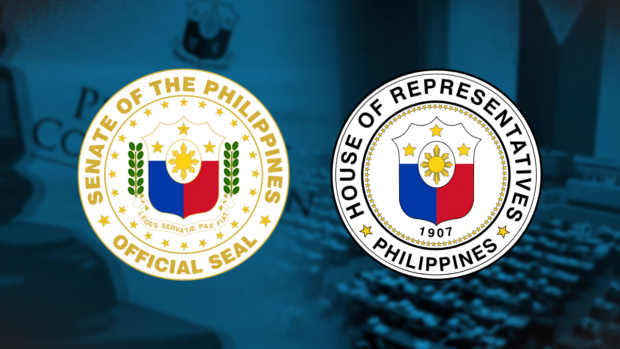Ex-justice to Congress: Meet as one, vote split
The House of Representatives and the Senate should convene together as one body in discussing the proposed amendments to the 1987 Constitution, retired Supreme Court Associate Justice Vicente Mendoza said on Monday.
During a Senate subcommittee deliberation on Resolution of Both Houses (RBH) No. 6, which proposes amendments to certain economic provisions of the Charter, Mendoza argued that Charter change was “not the work of Congress” since the senators and representatives were supposed to meet as a constituent assembly as spelled out in Article 17 of the Constitution.
“It is a non-legislative function [of Congress]. It is just as important as the declaration of a state of war, which requires Congress to meet jointly as one assembly and vote separately,” Mendoza said at the six-hour hearing.
“If you regard the amendment of the Constitution as important as that… would there be doubt in your mind that it is not Congress as a lawmaking body but [one that] wears a different hat, that of being a constituent assembly?” he pointed out.
According to the retired justice, the House and the Senate should hold a session together and jointly pass a resolution convening themselves as a constituent assembly.
Article continues after this advertisementIn fact, Mendoza said, the Supreme Court had previously ruled in two separate cases that “when they act as an assembly, they do not act with any distinction whether they are senators or congressmen.”
Article continues after this advertisement“They act as one assembly, as members of a constituent assembly,’” Mendoza said.
Mendoza was among the resource speakers, including legal luminaries and economists, invited by the Senate to the hearing.
Others present at the hearing to give their views on RBH No. 6 were retired Chief Justice Hilario Davide Jr., former Supreme Court Associate Justice Adolfo Azcuna, and former Commission on Elections Chair Christian Monsod.
University of the Philippines School of Economics professor emeritus Gerardo Sicat, former Finance Secretary Margarito Teves and IBON Foundation executive director Sonny Africa also attended the hearing.
Sicat and Teves were both in favor of amending the “restrictive” economic provisions in the Constitution.
“Those provisions have hampered [the country’s] progress because we failed to invite or bring in foreign capital that is so critical to a country that has insufficient amount of savings to generate that high level of development… I consider them to be the main cause of the country’s relative decline with respect to our neighbors in the Southeast Asian region,” Sicat said.
He said that undertaking the amendments “will be the biggest boost that we need in opening the country toward more modernity, technological progress, higher incomes for our people, better employment for our workers, greater pride in our country’s achievement in the economic field, and greater pride in relation to our neighbors as we restore our old position in the past.”
According to Teves, “the close and restrictive model has been with us since 1935 and it contributed to the inability of our country to progress. It is high time to change the business model under the Constitution.”
Risk to education sector
However, Davide cautioned that amending the “restrictive” economic provisions of the Constitution would be a “lethal experiment,” warning that it might create more problems for the country in the future.
Davide cited foreign ownership in the country’s basic education system as among the “more disturbing and serious problems and consequences” of Charter change in the future.
“With foreign control or dominance in our basic education, we would undermine the noble, patriotic and nationalistic virtues which are constitutionally mandated to be a part of the curricula of all educational institutions,” he pointed out.
“For instance, if a Chinese educational entity would now come in, do you expect it to be faithful enough to comply with these mandates? Would not its teachings focus on Chinese philosophy or even on the life of Mao Zedong?” he asked.
He also warned that it would be “extremely dangerous” if the country were to leave to Congress the extent of Filipino ownership requirements in public utilities and advertising.
“The day will not be far when public utilities and advertising industries will be under control or even under the full ownership of aliens,” he said.
Senate in no rush
Meanwhile, senators on Monday said they would be treading lightly in tackling RBH No. 6, with Senate President Juan Miguel Zubiri underscoring the need to consult all sectors of society.
Senate Majority Leader Joel Villanueva also stressed that the chamber would tackle the resolution as they deem fit after some leaders of the House called on the Senate to wrap up the hearings by March.
Angara said it would be ideal to finish the proceedings before October to allow the Commission on Elections (Comelec) to prepare for a possible plebiscite that may be held simultaneously with the 2025 midterm balloting.
Also on Monday, more than 60 civil society groups gathered at the Bantayog ng Bayani Auditorium in Quezon City to commemorate the 38th anniversary of the 1986 Edsa People Power Revolution and to express their opposition to the proposed Charter change.
READ: INQToday: Charter framer Hilario Davide Jr. warns vs changing economic provisions
The groups formed the Buhay ang Edsa campaign network to uphold the spirit and legacy of the Edsa uprising that toppled the Marcos dictatorship.
“We oppose all present attempts to revise our current Constitution by whatever means under this administration,” the coalition said in a statement. —WITH A REPORT FROM RUSSEL LORETO INQ
